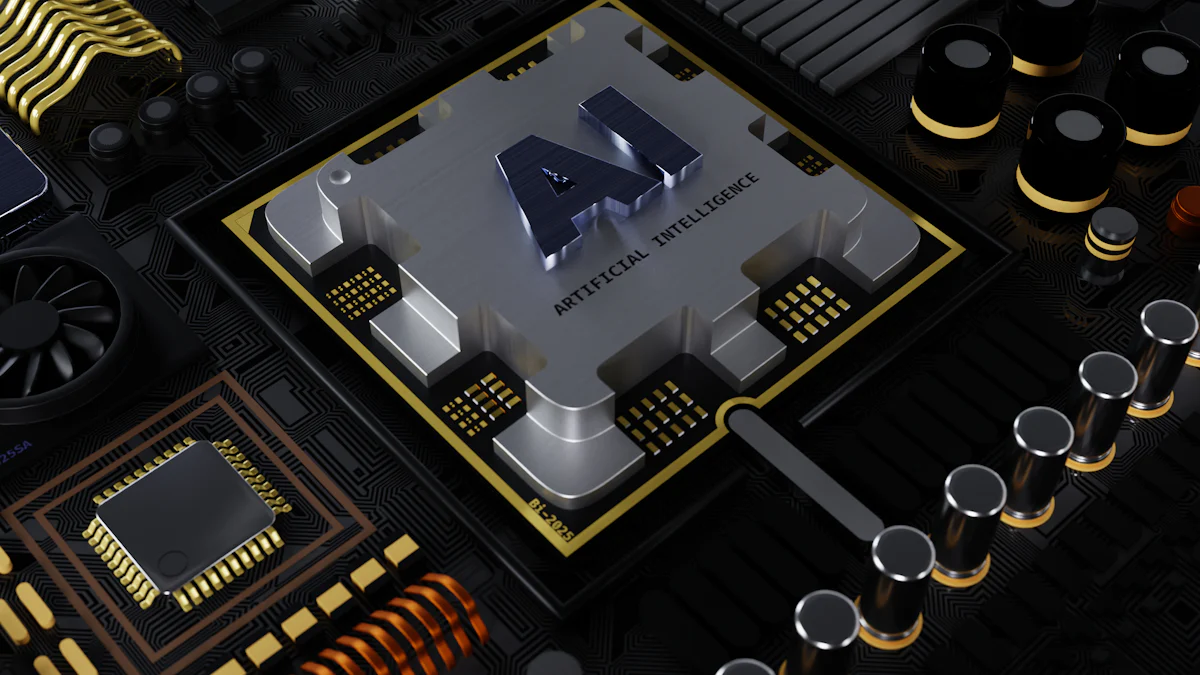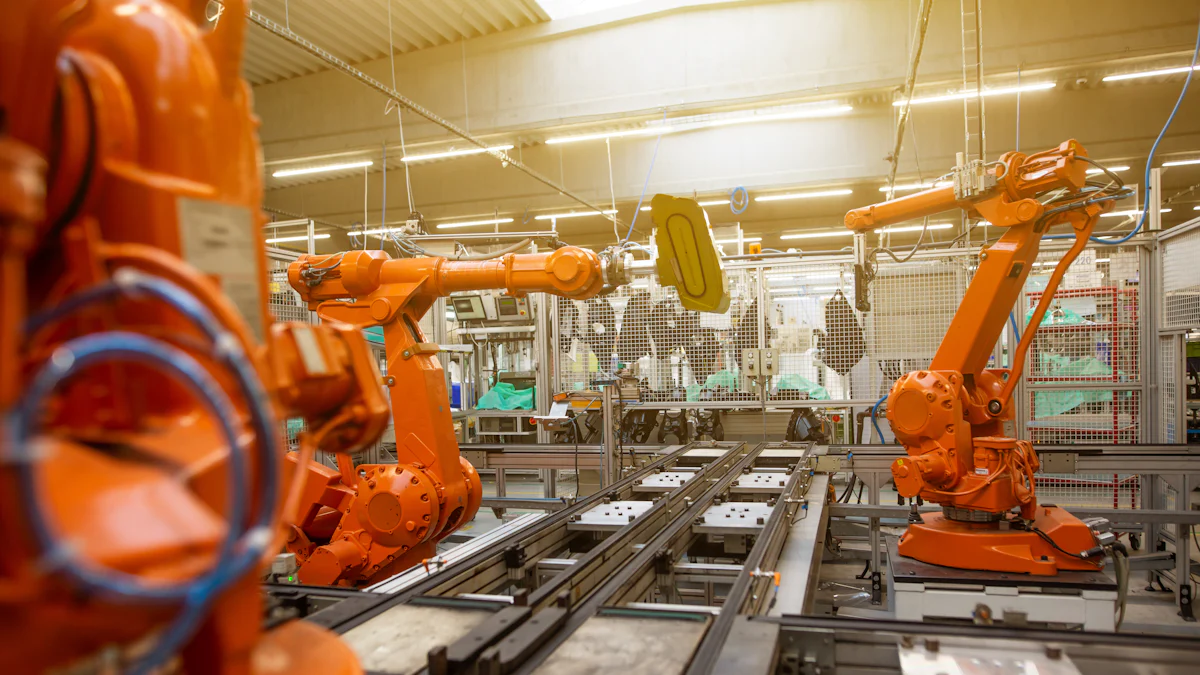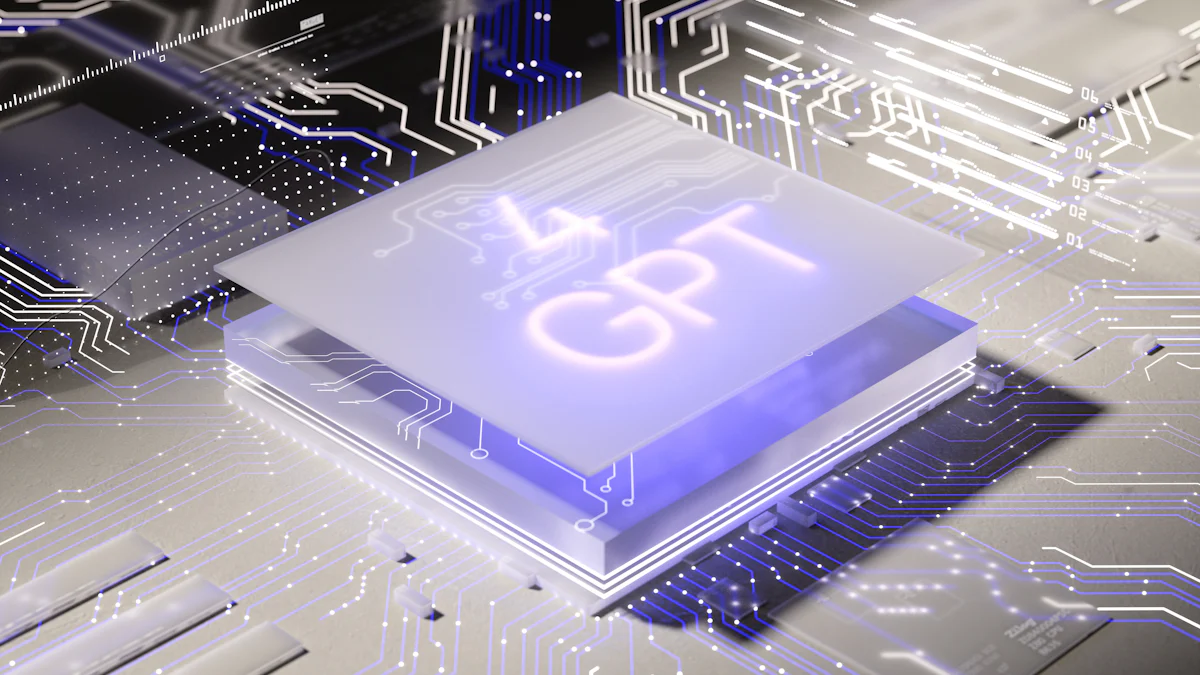Tthe impact of AI automation on various sectors and its potential to drive innovation.

AI automation reshapes industries and transforms business operations. The integration of artificial intelligence and automation streamlines processes and enhances productivity. Over 60% of business owners believe AI will increase productivity, with many organizations adopting AI to varying degrees. Khurram Akhtar, a Forbes Councils member, highlights that AI technology can increase business productivity by 40%. The purpose of this blog is to explore the impact of AI automation on various sectors and its potential to drive innovation.
Historical Context of AI Automation
Early Developments in Artificial Intelligence
Initial concepts and theories
Historically artificial intelligence began with the idea of creating machines that could mimic human thought. Alan Turing, a pioneer in computer science, proposed the concept of a machine that could simulate any human intelligence. The Turing Test emerged as a method to evaluate a machine's ability to exhibit intelligent behavior. This test set the foundation for future AI research.
Key milestones in AI history
Key milestones marked the journey of artificial intelligence. In 1951, Christopher Strachey developed the first documented AI program. This program played a complete game of checkers on the Ferranti Mark I computer. Another significant event occurred when IBM's Deep Blue defeated Garry Kasparov in chess. This victory raised questions about machines outsmarting humans in various tasks. These milestones demonstrated the potential of AI and its impact on society.
Evolution of Automation
Industrial revolution and mechanization
The Industrial Revolution introduced mechanization, transforming industries. Factories used machines to increase production and reduce manual labor. Automation began with simple mechanical devices that performed repetitive tasks. This shift improved efficiency and productivity in manufacturing.
Transition to digital automation
Digital automation emerged as technology advanced. Computers and software replaced mechanical systems, enabling more complex tasks. Businesses adopted digital tools to streamline operations and improve accuracy. The transition to digital automation paved the way for AI integration. Artificial intelligence holds revolutionizing potential for industries seeking to enhance processes.
The historical context makes it clear that artificial intelligence has evolved significantly. AI automation continues to shape modern industries. The journey from initial concepts to digital automation highlights the transformative power of AI.
Current Applications of AI Automation

AI in Manufacturing
Manufacturing industries have embraced AI automation to enhance efficiency and productivity. Factories use AI-enabled robotic arms for tasks like assembly and stacking. These robots work alongside humans to optimize production lines. Predictive analysis sensors monitor equipment health, reducing downtime and maintenance costs. The integration of artificial intelligence in manufacturing ensures smooth operations and high-quality output.
Robotics and Production Lines
Robotic systems powered by AI automation revolutionize production lines. Factories deploy these systems to perform repetitive tasks with precision. AI-generated algorithms guide robotic arms in assembling products efficiently. This collaboration between humans and machines boosts productivity and reduces errors. Manufacturing units achieve higher output levels through artificial intelligence.
Quality Control and Predictive Maintenance
Quality control benefits significantly from AI automation. AI-generated models analyze product quality in real-time. Factories utilize artificial intelligence to detect defects and ensure consistency. Predictive maintenance uses AI to forecast equipment failures. This proactive approach minimizes disruptions and extends machinery lifespan. Artificial intelligence enhances both quality assurance and operational efficiency.
AI in Healthcare
The Healthcare sector experiences transformative changes with AI automation. Medical professionals use AI-generated tools for diagnostics and patient care. Machine learning models analyze medical images like X-rays and MRIs. This technology aids doctors in early disease detection. Artificial intelligence supports healthcare providers in delivering accurate diagnoses.
Diagnostic Tools and Patient Care
AI-generated diagnostic tools assist in identifying diseases. Medical practitioners rely on these tools for precise data interpretation. AI automation streamlines the diagnostic process, allowing doctors to focus on patient care. Healthcare facilities benefit from faster and more accurate diagnoses. Artificial intelligence plays a crucial role in improving patient outcomes.
Administrative Automation
Administrative tasks in Healthcare become more efficient with AI automation. Hospitals use AI-generated systems for scheduling, billing, and record-keeping. These systems reduce manual errors and save time. Artificial intelligence optimizes administrative processes, enabling healthcare professionals to concentrate on patient needs. The integration of AI in administration enhances overall operational efficiency.
AI in Finance
Financial institutions leverage AI automation to improve decision-making and risk management. Banks use AI-generated algorithms for fraud detection and customer evaluation. Traders utilize artificial intelligence to analyze vast data sets quickly. This capability allows them to make informed investment decisions. AI automation transforms the finance sector by providing valuable insights.
Algorithmic Trading
Algorithmic trading relies on AI automation for analyzing market trends. Financial experts use AI-generated models to execute trades at optimal times. These models assess millions of data points to predict market movements. Artificial intelligence enhances trading strategies, leading to better investment outcomes. The finance industry benefits from increased efficiency and reduced risks.
Fraud Detection and Risk Management
Fraud detection becomes more effective with AI automation. Banks employ AI-generated systems to identify suspicious activities. These systems analyze transaction patterns to detect anomalies. Artificial intelligence strengthens security measures and protects against financial fraud. Risk management improves as AI provides insights into potential threats. Financial institutions rely on AI to safeguard assets and ensure compliance.
Adopting Automation Across Industries
AI in Various Industries
AI in Retail
Retail businesses embrace AI automation to enhance customer experiences and streamline operations. AI tools analyze customer data to personalize shopping experiences. Retailers use AI to manage inventory efficiently. Predictive analytics help forecast demand and optimize stock levels. AI-driven chatbots assist customers, providing instant support and improving satisfaction. Retail industries leverage AI to gain a competitive edge.
AI in Transportation
Transportation industries adopt AI automation for improved efficiency and safety. AI systems optimize routes and reduce fuel consumption. Autonomous vehicles rely on AI for navigation and obstacle detection. Public transportation uses AI to manage schedules and enhance passenger experiences. AI-powered traffic management systems improve flow and reduce congestion. Transportation sectors benefit from AI by enhancing operational efficiency.
Challenges in Adoption
Technological Barriers
Businesses face technological barriers when adopting automation. The complexity of AI systems poses challenges. Companies need skilled professionals to implement AI solutions effectively. The lack of technical expertise hinders adoption. Businesses must invest in training and development to overcome these barriers. Upgrading existing infrastructure requires significant resources.
Regulatory and Compliance Issues
Regulatory and compliance issues present challenges in AI adoption. Industries must navigate complex regulations governing AI use. Data privacy concerns require careful consideration. Businesses need to ensure compliance with industry standards. Regulatory frameworks vary across regions, complicating adoption efforts. Companies must address these issues to successfully integrate AI automation.
Balancing AI and Human Interaction
Ethical Considerations
Privacy Concerns
AI systems process vast amounts of data. This raises significant privacy concerns. Organizations must ensure that AI respects user privacy. Data protection laws require compliance. Companies need to implement robust security measures. These measures prevent unauthorized access to sensitive information. Humanity Institute at Oxford emphasizes the importance of ethical data handling. AI developers must prioritize user privacy.
Bias and Fairness in AI Systems
Bias in AI systems poses ethical challenges. Algorithms can reflect societal biases. These biases lead to unfair outcomes. Developers must address bias during AI design. Institute at Oxford University advocates for fairness in AI. Transparent algorithms promote accountability. Human oversight ensures ethical AI deployment. Fairness in AI systems prevents discrimination.
Human-AI Collaboration
Enhancing Human Capabilities
AI enhances human capabilities. AI tools assist in complex tasks. These tools improve decision-making processes. AI provides valuable insights. CTO David Vandegrift recently highlighted AI's role in augmenting human skills. AI empowers professionals across industries. AI collaboration leads to better outcomes. AI and humans work together effectively.
Job Displacement and Creation
AI automation impacts job markets. Some roles face displacement risks. However, AI creates new opportunities. Roles in data science and AI engineering emerge. Exceed Human Performance becomes possible with AI. AI requires skilled professionals for development. Training programs prepare workers for AI roles. AI advancements drive job creation. The balance between displacement and creation remains crucial.
Future Implications of AI Automation

Technological Advancements
Emerging AI technologies
New AI technologies emerge rapidly. Machine learning and deep learning lead the way. These technologies enhance decision-making processes. The Internet of Things (IoT) connects devices seamlessly. AI analyzes data from these devices for better insights. Universities conduct research to push AI boundaries. AI systems become more sophisticated and efficient. Businesses adopt these technologies for competitive advantage.
Potential for innovation
AI automation drives innovation across sectors. Companies develop new products and services. AI tools streamline research and development processes. Startups leverage AI to disrupt traditional industries. AI fosters creativity and problem-solving. Organizations explore novel applications of AI. The potential for innovation remains vast. AI continues to change the world in unexpected ways.
Societal Impact
Changes in workforce dynamics
AI automation reshapes workforce dynamics. Many jobs evolve with AI integration. Workers need new skills to stay relevant. Universities offer courses on AI and data science. Employees engage in continuous learning. AI creates opportunities for job growth. Companies invest in reskilling programs. The workforce adapts to technological changes.
Global economic implications
AI impacts global economies significantly. Countries invest in AI research and development. Economic growth accelerates with AI adoption. Businesses increase productivity and efficiency. AI reduces operational costs for companies. Global trade benefits from AI-driven insights. Economies experience shifts in labor demand. Policymakers address challenges and opportunities. AI shapes the future of global markets.
AI automation has evolved significantly, reshaping industries and enhancing productivity. The future holds immense potential for AI, with advancements expected to revolutionize sectors like healthcare and finance. However, challenges such as data privacy and bias must be addressed. Businesses need to understand AI's effects to leverage its potential. AI will shift skills rather than replace workers, creating opportunities for reskilling. Striking the right balance between human and AI involvement is crucial. Share insights on AI automation's impact and potential. Share to Facebook, Share to Linkedin, or Share to Twitter to spread awareness.
See Also
Selecting the Top AI Automation Firm for Your Needs
The Impact of AI Automation Agencies on Your Business
Exploring the AI Automation Agency Landscape: Your Roadmap
Key Areas for Automation Agencies in 2024: Maximizing Results
